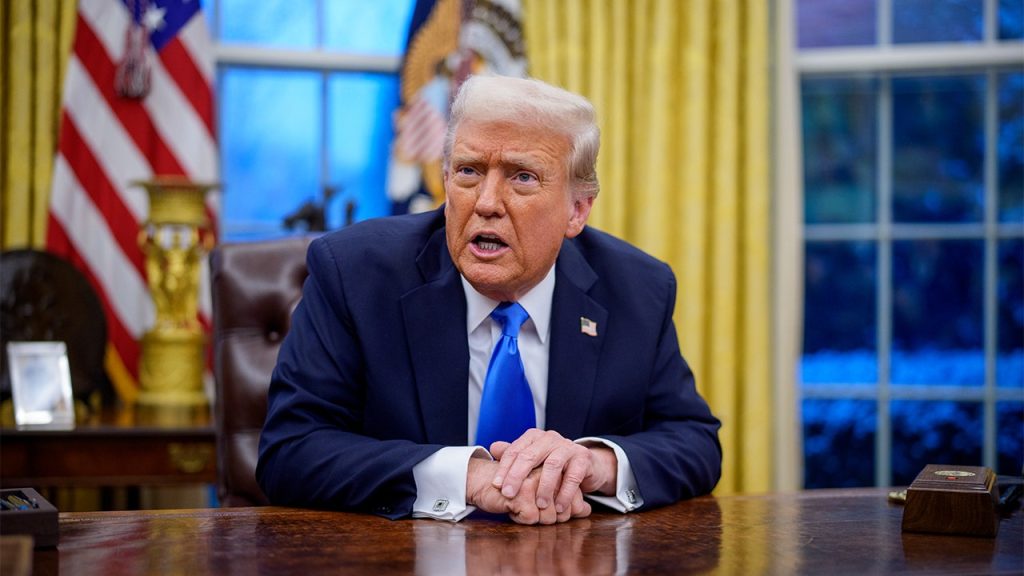In recent statements, former President Donald Trump expressed his support for Republican efforts aimed at reinstating direct federal control over Washington, D.C. During a media interaction aboard Air Force One, he criticized the current state of the capital, particularly focusing on crime and homelessness. Trump’s comments reflect a broader Republican sentiment advocating for increased congressional oversight in D.C. governance.
| Article Subheadings |
|---|
| 1) Trump Advocates for Federal Intervention in D.C. |
| 2) Current State of Crime and Homelessness |
| 3) Congressional Authority Over D.C. Governance |
| 4) Trump’s Critique of Local Leadership |
| 5) Impacts of Potential Federal Control |
Trump Advocates for Federal Intervention in D.C.
Former President Donald Trump recently made headlines by voicing support for Republican initiatives aimed at reinstating direct federal oversight over Washington, D.C. Speaking to reporters on Air Force One, Trump lamented the deteriorating conditions in the capital, citing crime rates and visible homelessness as pressing issues that warrant immediate governmental action. “I think we should take over Washington, D.C., — make it safe,” he stated, indicating a desire for the capital to be better managed. This call for federal intervention resonates with a faction of congressional Republicans who are increasingly critical of the District’s governance.
Current State of Crime and Homelessness
During his remarks, Trump expressed concern over the escalating crime rates and increase in homelessness in Washington, D.C. Various studies and reports have indicated that the District has faced challenges in addressing these issues, contributing to a sense of unease among residents and visitors alike. Trump articulated a vision where the capital should present an image of safety and hospitality, particularly when welcoming international leaders. His remarks reflect a broader unease within segments of the Republican Party regarding the state of D.C. and the implications of local governance.
Congressional Authority Over D.C. Governance
The governance of Washington, D.C. has long been an issue of political debate. Under the city’s Home Rule authority, Congress retains the power to review and potentially overturn laws passed by the D.C. Council. Trump’s calls for direct federal control suggest a desire to re-establish a greater federal role in local governance, harking back to a historical precedent when the federal government exerted complete control over the District. This movement has gained traction among certain Republican lawmakers who argue that the city’s leadership has failed to effectively address its challenges.
Trump’s Critique of Local Leadership
While expressing that he personally likes D.C. Mayor Muriel Bowser, Trump was dismissive of her administration’s handling of the city’s affairs, stating, “They’re not doing the job.” His criticisms align with a growing narrative among some constituents who feel that local governance is failing to meet basic needs. Trump elaborated on this by highlighting disturbing realities, such as tents set up on what he described as “magnificent lawns,” underscoring a perceived clash between the city’s visuals and its governance. This discontent serves as a key motivator for Republicans seeking more federal oversight.
Impacts of Potential Federal Control
Should Congress pursue the path of reinstating direct federal control over Washington, D.C., the implications could be significant. Proponents argue it might offer a solution to the city’s governance problems, potentially leading to improvements in public safety and urban management. However, opponents warn that such actions would infringe upon the autonomy that local officials have worked to maintain for over four decades under Home Rule. The debate continues to be polarized, raising questions about the balance of power between local and federal authorities, as well as the implications for democratic representation in the nation’s capital.
| No. | Key Points |
|---|---|
| 1 | Trump supports GOP efforts to put D.C. under federal control. |
| 2 | Crime and homelessness are top concerns for Trump in D.C. |
| 3 | Congress holds the authority to overturn D.C. laws. |
| 4 | Trump criticizes local leadership for not effectively managing the city. |
| 5 | Federal control may alter the balance of power in D.C. |
Summary
The recent remarks by former President Donald Trump represent a significant call to action for Republican lawmakers seeking to address perceived deficiencies in the governance of Washington, D.C. As Trump advocates for a reevaluation of local management through federal intervention, discussions surrounding crime, homelessness, and political authority remain at the forefront of the national dialogue. The outcome of this debate could have lasting implications for D.C.’s governance and the relationship between local officials and congressional leaders.
Frequently Asked Questions
Question: Why does Trump support federal control of Washington, D.C.?
Trump supports federal control primarily due to concerns about crime and homelessness in the city, indicating a belief that federal oversight might lead to better management and safety.
Question: What powers does Congress have over D.C. governance?
Congress has the authority to review and overturn laws passed by the D.C. Council under the Home Rule authority, maintaining significant oversight over local legislation.
Question: How do local leaders respond to calls for federal intervention?
Local leaders have often expressed concern that federal intervention undermines local governance and disrupts the efforts of city officials who are best positioned to address municipal issues.


